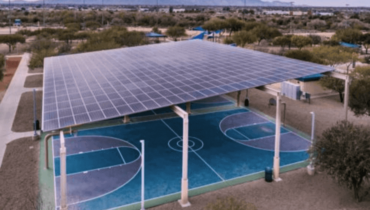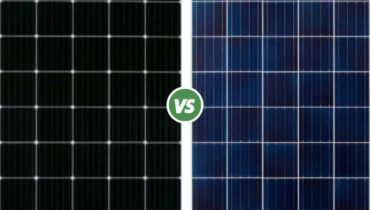Table of Contents
Solar panels have revolutionized the way we power our RVs, offering an eco-friendly and cost-effective alternative to traditional electricity sources. Whether you’re a seasoned road warrior or just starting your RV journey, When it comes to best solar panels for RV battery charging, finding the right ones is essential for a smooth and sustainable adventure. In this guide, we’ll explore the six best solar panels for RVs, catering to various needs and budgets.
RV enthusiasts seeking sustainable and cost-effective power solutions have turned to solar panels to fuel their adventures. Solar panels not only reduce carbon footprints but also offer the freedom to explore off-the-grid locations without worrying about power sources. In this guide, we’ll introduce you to the six best solar panels designed specifically for RVs, catering to various needs and budgets.
Best Overall: Renogy 200-Watt 12-Volt Monocrystalline Solar Starter Kit
When it comes to reliability and performance, the Renogy 200-Watt 12-Volt Monocrystalline Solar Starter Kit takes the crown. Renogy is a trusted name in the solar industry, known for its high-quality products. This kit includes everything you need to get started, from solar panels to charge controllers. With its efficient monocrystalline panels, it can generate ample power for your RV adventures.
Best Budget: Newpowa 100W 12V Monocrystalline Solar Panel
For budget-conscious RVers, the Newpowa 100W 12V Monocrystalline Solar Panel is an excellent choice. Despite its affordability, this panel doesn’t compromise on quality. It’s durable, efficient, and perfect for those looking to dip their toes into solar power without breaking the bank. When considering solar options for your RV, exploring choices for the Best Solar Panels for RV can help you make a well-informed decision.
Best Splurge: ACOPOWER 800W Monocrystalline Panel Solar RV Kits
If you’re ready to invest in a high-powered system, the ACOPOWER 800W Monocrystalline Panel Solar RV Kit is the ultimate splurge. This kit is a powerhouse, capable of providing ample electricity for all your appliances and gadgets. It’s perfect for RVers who want all the comforts of home while on the road. When enhancing your RV experience, consider investing in the best RV solar panels to ensure a reliable and sustainable power source, allowing you to enjoy modern conveniences wherever your travels take you.
Best Flexible: SunPower 110 Watt Flexible Solar Panel
For RVs with unconventional roof shapes or those who prefer a sleek and inconspicuous look, flexible solar panels like the SunPower 110 Watt model are a great choice. When considering the best portable solar panels, these panels can conform to curved surfaces and are lightweight, making them easy to install. Despite their flexibility, they still deliver impressive power output.
Best High Power: Nature Power 215-Watt Monocrystalline Solar Panel for 12-Volt Systems
If you’re looking for raw power, the Nature Power 215-Watt Monocrystalline Solar Panel is your best bet. When contemplating how to add solar panels to RV, this panel is designed for serious RVers who demand high energy production. It’s perfect for those who have energy-hungry appliances or plan to spend extended periods off the grid.
Best Suitcase: Zamp Solar Legacy Series 140-Watt Portable Solar Panel Kit
For RVers constantly on the move, the Zamp Solar Legacy Series 140-Watt Portable Solar Panel Kit is a convenient solution. This suitcase-style kit is easy to transport and set up wherever you park your RV. When seeking the best lithium-ion battery for RV solar, it proves to be a versatile option for those who prioritize flexibility and portability in their solar setup.
What to Look for in Solar Panels for RVs
When choosing solar panels for your RV, When exploring how to hook up solar panels to RV batteries, it’s essential to consider factors such as panel type (monocrystalline vs. polycrystalline), wattage, durability, and compatibility with your RV’s electrical system. Additionally, factor in considerations like your budget and whether you need a complete kit or just the panels themselves.
Maintenance and Care for RV Solar Panels
RV solar panels are a fantastic investment for those who love to hit the open road while minimizing their environmental impact and energy costs. To ensure that your solar panels continue to provide efficient power generation for your RV, it’s crucial to perform regular maintenance and care. In this guide, we will walk you through essential steps to keep your RV solar panels in tip-top shape.
Why Maintenance Matters
When looking for the best solar chargers for backpacking, it’s crucial to understand that proper maintenance not only extends the lifespan of your RV solar panels but also maximizes their efficiency. Neglecting maintenance can lead to decreased power output and potentially costly repairs down the road. Here’s how you can take care of your RV solar panels:
Regular Cleaning
Cleaning Procedure
One of the simplest yet most effective ways to maintain your RV solar panels is by keeping them clean. Dust, dirt, bird droppings, and other debris can accumulate on the panels over time, reducing their efficiency. Here’s how to clean your solar panels:
What You’ll Need
- Soft bristle brush or sponge
- Mild dish soap
- Distilled water
- Squeegee or soft cloth
Steps
- Start by gently brushing or rinsing off loose dirt and debris with a soft bristle brush or sponge.
- Mix a solution of mild dish soap and distilled water.
- Use this soapy water solution to wash the solar panels. Avoid using abrasive materials or harsh chemicals that could scratch or damage the panels.
- Rinse the panels thoroughly with distilled water to remove any soap residue.
- Use a squeegee or a soft cloth to dry the panels, ensuring there are no water spots left behind.
Frequency
Clean your RV solar panels at least once a month, or more often if you regularly travel through dusty or dirty environments.
Inspecting for Damage
Visual Inspection
Regularly inspect your solar panels for any signs of damage. This includes cracks, chips, or discoloration on the panels themselves, as well as loose or corroded connections in the wiring. If you spot any issues, address them promptly.
Wiring Inspection
- Check all wiring connections for tightness and signs of corrosion. Clean and tighten connections as needed.
- Examine the cables for any fraying or damage. Replace damaged cables immediately to prevent electrical issues.
Monitoring Performance
Tracking Power Output
Keep an eye on your solar panel’s power output. Most solar charge controllers have a display that shows current and historical power production. By monitoring this data, you can detect any significant drops in performance and take action accordingly.
Identifying Issues
If you notice a consistent decrease in power output that isn’t due to changes in weather or shading, it may be a sign of a malfunctioning panel or component. In such cases, consult a professional for diagnosis and repairs.
Protecting Against Harsh Weather
Extreme Weather Precautions
While RV solar panels are built to withstand various weather conditions, extreme weather events like hailstorms or heavy snowfall can potentially damage them. When expecting severe weather, take precautions to protect your panels:
Hailstorms
If you anticipate hail, consider covering your panels with protective materials like foam board or heavy blankets. Ensure they are securely fastened to prevent wind from blowing them away.
Heavy Snow
Remove snow from your panels using a soft brush or a gentle push broom. Avoid using sharp tools that could scratch the surface.
FAQs
How many solar panels do I need for my RV?
The number of solar panels you need depends on your energy consumption and the size of your RV. Calculate your daily power usage and choose panels that can meet or exceed that demand.
Can I install solar panels on my RV myself?
Yes, many RVers install solar panels themselves. However, if you’re not confident in your DIY skills, it’s advisable to seek professional installation.
Do solar panels work in cloudy weather?
Solar panels can still generate some power on cloudy days, although their efficiency decreases. Consider a larger panel array or a backup power source if you anticipate frequent cloudy weather.
Conclusion
Investing in solar panels for your RV is a smart choice for both the environment and your wallet. The right solar panel setup can provide you with the freedom to go off-grid and enjoy the open road without worrying about power sources. Whether you’re seeking the best overall performance, staying on a budget, or prioritizing flexibility, there’s a solar panel solution for every RVer. Evaluate your needs and preferences, and embark on your RV adventures with clean and renewable energy.
The Renogy 200-Watt Solar Starter Kit is perfect for those who prioritize reliability and performance, while the Newpowa 100W panel offers budget-conscious options. For those who crave power, the ACOPOWER 800W kit is an investment worth considering. Make your choice wisely, and enjoy the freedom of sustainable energy during your RV adventures.

